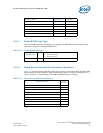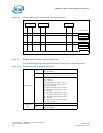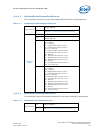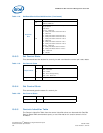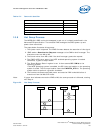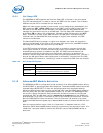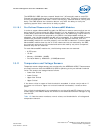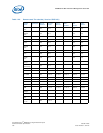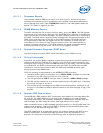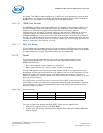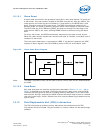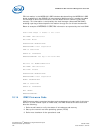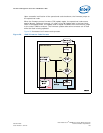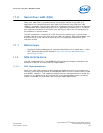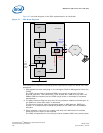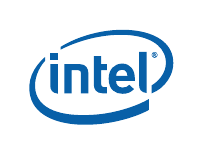
Intel NetStructure
®
MPCBL0010 Single Board Computer
October 2006 Technical Product Specification
Order Number: 304120 139
Hardware Management Overview—MPCBL0010 SBC
10.11.1 Processor Events
The processor asserts IERR as the result of an internal error. A thermal trip error
indicates the processor junction temperature has reached a level where permanent
silicon damage may occur. Upon THERMTRIP assertion, the IPMC powers down the
boards. This event is logged in the SEL.
10.11.2 DIMM Memory Events
The MCH instructs the ICH to report memory parity errors via SMI#. The SMI handler
extracts the error information (address) from the DRAM error registers in the MCH and
logs it into the SEL on the shelf manager. The KCS interface performs error reporting to
the IPMC. The BIOS sends a platform event message with the appropriate data to the
IPMC, which logs the event to the SEL on the shelf manager. Correctable memory
errors generate an SMI and are logged into the SEL. Normally, a board with non-
correctable errors is likely to hang since the multi-bit error can cause the CPU to
execute corrupted instructions. If the CPU executes corrupted instructions before
executing the code to log the event, the event is not logged in the SEL.
10.11.3 System Firmware Progress (POST Error)
The BIOS is able to log both POST and critical events to the IPMC error log.
10.11.4 Critical Interrupts
In general, the system BIOS is capable of generating requests on the KCS interface to
communicate with the IPMC for error logging, fault resilience, critical interrupts, and
reading/writing inventory of CPU and RAM information to the IPMC. Two LPC interfaces
are available for the BIOS to communicate with the IPMC. The BIOS uses the SMS
interface for normal communication with the IPMC and the SMM interface when
executing code under SMM mode.
PCI error handling is implemented in the MPCBL0010 SBC as follows:
1. The MCH sends a parity error/system error (PERR/SERR) message over the hub
interface to the ICH notifying it that an error occurred.
2. The ICH generates an SMI# interrupt when it receives a PERR/SERR message.
3. The SMI handler checks the error status registers of the CPU/MCH until it identifies
the source and type of the error.
4. The handler sends a message to the IPMC via the KCS interface, causing it to log
the error in the IPMC and then forward the event to the shelf manager to log it into
the SEL.
10.11.5 System ACPI Power State
The MPCBL0010 SBC supports ACPI functionality with support for the sleep states S0,
S4, and S5. The IPMC sends out a hot swap event message to the shelf manager
requesting deactivation. On successful reception of a deactivation message from the
shelf manager, the FRU enters M1 power state and remains in this state.
Under conditions where an ACPI enabled operating system is in S4/S5 sleep state, the
chipset could de-assert, requiring the IPMC to attempt an AdvancedTCA power state
transition to the M4 state (through M2, M3).
The ACPI capabilities of an operating system are communicated by the BIOS to the
IPMC at initialization. An OEM-style IPMI command is sent by the BIOS for this
purpose. This command is sent by the BIOS every time an operating system is



